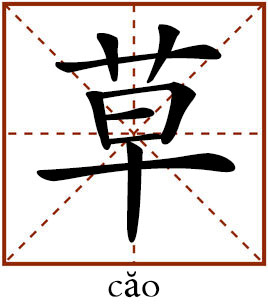Cao triggers love, reflections on the past

Lush grass spreading over the old road symbolizes vitality as well as the lush sorrow when bidding farewell to a friend.

Cao refers to all kinds of herbs, including grass and weeds. Green grasses and weeds are symbols of strong love and tenacious vitality. In certain cases, they also symbolize fine virtues and reflections on past history.
The Chinese character cao refers to various herbs, including grass and weeds. It is an important symbol in classical Chinese literature. In ancient Chinese agrarian society, poets expressed their complex inner feelings via analogies and symbol related to the ordinary grass and weeds that they saw in daily life. The exuberant grass and weeds are symbols of strong love and tenacious vitality. Under certain circumstances, they also symbolize fine virtues and reflections on past history.
Love, sorrow
The use of grass imagery in literature dates back to works in the pre-Qin period. Several songs in the Book of Songs contain descriptions about grass and weeds. However, concentrating on the natural properties of various types of herbs, these songs used herbs in analogies or as a theme. The cao symbolism was not yet distinctive at this period of time. However, these songs contributed to the development of cao symbolism in Chinese literature.
Picking certain herbs in Chinese literature is a common metaphor for yearning to see someone. This tradition can be traced back to the Book of Songs. For example, the song The Chickweed includes the line: “The chickweed is green; That I in my basket glean. I guess, my dear sweetheart, Another journey will start.” This poem describes a woman picking chickweed. However, after a long time, the basket had not yet been filled up. She was worried about her husband who was in service far from home. How could she focus on her work in the field?
Another song, Gathering Grass has the line: “The morning I gather green grass there; Is past before my hands are full. I must go home and wash my hair; For it is wispy like wool. The morning I gather blue grass there; Is past before my apron is full. To meet in five days again we swear; Another day I wait like a fool.” This song describes another wife who waited six days to see her husband. So eager to reunite with her husband, how could she keep her mind on gathering grass?
The yearning for love and the pursuit of a happy marriage is part of human nature. The green cao, which shows strong vitality, became a common image for one’s passionate pursuit of love. The song The Creeping Grass in the Book of Songs was a typical example of this. The song goes “The green grass creeps across the plain, While dew lie thick like drops of rain. A beauty from afar arises, With crescent brows and clear large eyes. By chance I meet her on the way, Who makes me happy, makes me gay.” The green creeping grass easily triggers thoughts of romantic and liberated love between a boy and a girl when they encounter each other in vibrant wild natural surroundings.
In addition to love, cao also symbolizes the sorrow of bidding farewell to friends and homesickness. A famous lyric song by Li Shutong (1880-1942) goes “Beyond the roadside pavilion, beside the ancient road, reaching the sky are the fragrant grasses green.” Chinese people usually stop at roadside pavilions when bidding farewell to a friend. Friends gradually disappear from sight and the only thing one can see is the green grass far away, touching the skyline. How cruel the grass is to stand between and block my view of my friend!
A well-known poem by Cui Hao (704-754) goes “By sunlit river trees can be counted one by one; On Parrot Isle fragrant green grass grows fast and thick. Where is my native land beyond the setting sun? The mist-veiled waves of River Han make me homesick.” This poem is one of the best of its kind using cao to express one’s homesickness.
Vitality, virtue
Where there is land, there will be grass. Grass is the most common and tenacious form of life in nature. The flourishing green grass symbolizes vitality and vigor. As one of the first poems that Chinese people learn as children puts it: “Wild grasses spread over ancient plains; With spring and fall they come and go. Fire tries to burn them up in vain; They rise again when spring winds blow.”
Grass cannot be weeded out. As long as the grass roots survive, they will prosper and spread on the plains the following year. The fire cannot burn their roots into ashes. Blown by the wind and watered by the rain in spring, they grow as green as before. The strong vitality of grass brought strength and hope to people witnessing these phases each year.
In addition to the Book of Songs, the songs of Chu style are another important origin story of cao symbolism. Qu Yuan (c.340-c.278 BCE) established the symbolism of fragrant grass which contains multiple connotations. Most noticeably, Qu used the fragrant grass in general, or such specific types as orchids, angelica and magnolia, to symbolize virtuous officials. In contrast, he used weeds such as moxa to symbolize unvirtuous officials who would do anything possible to benefit themselves.
For example, verses like the following are quite common in songs of the Chu style: “In each and every place fragrant grass abounds; whereas your vision to your homeland is confined,” “otherwise, once the cuckoos begin to chuckle, the fragrant grasses will stand no chance to survive,” “The orchids and angelica lose their fragrance; And the form of wild-grass, the magnolia does assume. Oh, why do the old-time flowers let themselves sink; To the status of such grasses as the moxa, which stink.” Influenced by this, using fragrant grasses to manifest one’s moral integrity and vicious weeds to indicate one’s shameful deceit became common metaphors in Chinese literature.
Reflections on history
As Emperor Taizong of the Tang Dynasty, one of the greatest emperors in Chinese history, once said “Looking into a bronze mirror, one could adjust dressing. By setting history as a mirror, one knows the potential ups and downs of a dynasty, and by setting a single person as a mirror, one can understand what he has gained and lost.”
The emphasis on the important role of history in Chinese culture also deeply influenced writers. Reflecting upon history is a classic trope in Chinese literature. By commenting on historical events or figures, the writers either indirectly pointed out the problems of their time or expressed their sorrow at being unable to benefit society. Sometimes, they were also trying to warn the rulers to prepare for the unexpected, just as Mercius once said “One will survive in worries and miseries and perish in ease and comfort.”
Unlike the changing dynasties and times, grass withers and prospers year after year, serving both as foils for and witnesses to drastic historical changes. The weeds prospering at the ruins of previous prosperous cities and splendid buildings easily bring about the sense of the uncertainty and transience of history and life, as well as feelings about the finite nature of life and the infiniteness of time.
The Lane of Black Gown by Liu Yuxi (772-842) was one of most well-known poems reflecting on the past. The poem goes “Beside the Bridge of Vermilion Birds rank grasses overgrown; Over the Lane of Black Gown, the setting sun hangs low. Swallows that skimmed by painted eaves of buildings of the families of Wang and Xie in bygone days; Are dipping now among the humble homes’ doorways.”
The Lane of Black Gown was in present-day Nanjing, Jiangsu Province. Nanjing served as the capital of six dynasties before the Tang Dynasty. This lane was occupied by influential families, including Wang and Xie, in those prosperous ages. The writer described the image of the city overgrown with wild weeds and scattered with broken walls of previous splendid buildings when the capital city was relocated to Chang’an in the Tang Dynasty. The grasses by the bridge prospered every year while the families by the bridge fell and seldom rose again.
High positions and great wealth can never last. The worldly possessions will eventually turn into ashes, no matter how powerful or wealthy a person is. To some extent, this echoes the Confucian teachings about the three immortal things that a person should try to do during one’s mortal life—To leave the world with great virtues, to contribute to the nation and society, and to offer influential thoughts.
The great poet Li Bai also wrote a poem about Nanjing city. It goes “On Phoenix Terrace, once phoenixes came to sing; The birds are gone but still roll on the river’s waves. The ruined palaces of Wu Kingdom are buried beneath the weeds in spring; The ancient sages of Jin Dynasty in caps and gowns all lie in graves…As floating clouds can veil the bright sun from the eye; the Imperial court at Chang’an now out of sight saddens my heart.” The kings of the Wu Kingdom and the celebrities in the Jin Dynasty who used to live in Nanjing all turned into dust, leaving the world little to remember of them. The mortality of life urged the poet to do something immortal like contributing to the nation. However, flanked by the unvirtuous officials surrounding him, the ruler did not offer the poet this opportunity. How sad the poet was!
(edited by CHEN ALONG)
